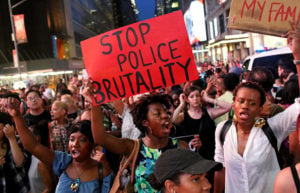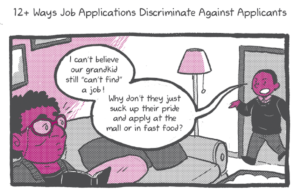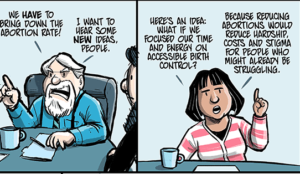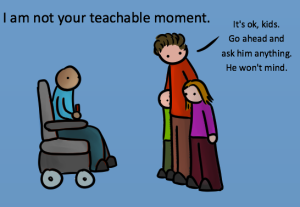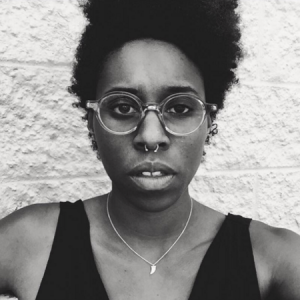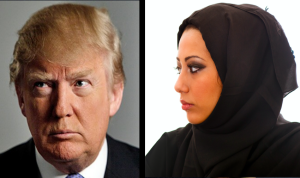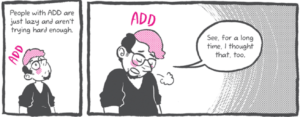
A group of young people standing in a hallway together, smiling.
I’ve encountered the same narrative a lot lately. It takes a handful of forms:
I know there are a lot of social problems now – but the millennial generation, they’re more progressive. They’ll fix it.
Millennials will spell the death of “traditional family values.”
What do you mean racism/sexism/homophobia/transphobia? Just look at how progressive the millennial generation is. Stop being so sensitive.
Whether intended as a compliment or as a criticism, this narrative is incredibly problematic.
As a “fringe millennial” myself (born in 1985), I take issue with the suggestion that today’s young people are all so progressive or that we’re necessarily more progressive than previous generations.
I remember plenty of “boys will be boys” instances growing up when “progressive” millennials threw racist and homophobic slurs at me – just because I was Latinx in a primarily white neighborhood and I didn’t engage in typical, toxic locker room talk.
I remember classmates (at my alma mater and elsewhere across the US) host racist fraternity parties with titles like “Big Bootie Hoes and Ghetto Bros” and “Tacos and Tequila,” participants attending in black- and brown-face. (FYI, these kinds of parties are still happening.)
I remember undergraduates hurling death threats to Native American students who were demanding that Chief Illiniwek, the University of Illinois’ racist mascot, be retired.
My point, though, is not only that we must dispel the myth that millennials are supposedly so anti-racist, anti-sexist, and otherwise invested in real equality. Rather, we must also examine the ramifications of this problematic sentiment.
For it excludes centuries of progressive individuals and communities who have long fought for liberation.
It also evades responsibility for social justice, passing the buck to supposedly “woke” millennials. Here’s how.
1. Racism and Sexism Are Going Strong
One doesn’t have to think hard to recall well-publicized accounts of oppressive young people.
Fraternities in particular, and universities in general, remain incubators for toxic masculinity and white supremacy. Just last year, a video was released of members of the University of Oklahoma branch of Sigma Alpha Epsilon singing a racist chant stating “there will never be a n****r at SAE.”
At the same time, a photo of a set of confidential rules for University of Texas’ Phi Gamma Delta were leaked. Alongside “no drugs” and “respect the ladies,” these rules included “no Mexicans,” “no interracial dating,” and (in misspelled all caps) “NO F*GETRY.”
What’s more, campuses continue to reinforce pervasive rape culture. Brock Allen Turner is only one example of the newest generation of rapists – few of which are ever held accountable – that have menaced colleges nationwide.
However, examples of oppressive millennial behavior don’t end at institutions of higher education. Consider Dylann Roof, the 21-year-old American terrorist who – following a legacy of lynchings against People of Color – killed nine Black churchgoers in Charleston, SC.
Consider, too, the Leader brothers of Boston who, in the latest installment of white nationalist xenophobia, urinated on and assaulted an unhoused Mexican man, later saying “Donald Trump was right: All these illegals need to be deported.”
There’s the “all lives matter” folks (aged under-30 and otherwise) who have burned Colin Kaepernick jerseys because the quarterback has sat during the national anthem to protest racialized police brutality.
There are the legions of millennial white saviors who reinforce colonial racism through their problematic interactions with People of Color across the Global South.
And then there are those “progressive” Berniebros who – implicitly or explicitly – reinforce male and white supremacy through ongoing man- and white-splaining.
Unfortunately, these are only the well-known accounts.
And they are certainly not exceptions to millennials’ supposed “colorblindness.” Reinforcing structural white supremacy and sexism, similar oppressive actions occur everyday throughout the United States.
Which is not to say that there are no progressive millennials. In fact, today’s young people do tend to be the most progressive age group. However, that’s a trend that we’ve seen for years.
Many – though certainly not all – are encouraged to explore progressive values as youths, to “get it out of our system” as it were. But we are simultaneously encouraged to return to conservative values as adults.
Furthermore, studies show that while today’s youth trend more progressive than their parents, most do not differ dramatically from their parents’ social or political values.
When examples of blatant bigotry reach the news, we can’t just shake our heads and think of them as rare exceptions – they’re actually part of the everyday oppression that still shows up in our country, publicized or not.
2. It Gives Credit to the Wrong People
Who comes to mind when you think of this supposedly more progressive millennial generation? A young white person who just happens to be more kind-hearted and enlightened than their grandparents?
This person’s enlightenment didn’t come out of nowhere!
Those from historically marginalized communities have known of their inherent equality from the start. And their progressive voices have been demanding liberation in the USA for centuries.
Disproportionately applauding millennials, therefore, ignores 500 years of liberatory resistance. It ignores that Indigenous Americans asserted themselves as equal to the Spanish, Dutch, French, and English, even in the face of genocidal settler colonialism.
It ignores that African slaves and their descendents have maintained their personhood even when US institutions have failed to protect it through coerced labor, Jim Crow segregation, police brutality, and so on.
Workers have known of their value, worth, and equality. So have women. So have people with disabilities. So have immigrants. So have LGBTQIA+ people.
The emphasis on millennials risks disregarding the ongoing struggle for Indigenous rights. It disregards the abolitionist movement. It disregards the Women’s Rights Movement, the Workers’ Rights Movement, the Civil Rights Movement, the Anti-War Movement, the Disability Rights Movement, the Gay Rights Movement.
In excluding generation upon generation of justice work, the emphasis on millennial progressivism rewards those who have historically reinforced and benefited from oppression.
In other words, it allows younger white men to adopt a moral high ground while simultaneously silencing those groups who have actually fought for equality.
3. It Ignores Ongoing Oppression
Emphasizing and re-emphasizing the supposed progressive values of the millennial generation sidesteps continued oppression throughout the US.
It risks suggesting that, because today’s youth are purportedly supporting liberation, all those from historically marginalized groups need to do is be patient – and quiet.
Significantly, just as progressive politics themselves are not new, neither is the patronizing attitude that suggests that we all must be patient, be happy with what we have.
Which is why this attitude is so telling!
Who is arguing that millennials are so open-minded, that we are on the eve of a new age of inclusive politics? Are they the Black, Latinx, Native, deaf, and neuroatypical victims and family members of police brutality? Are they the Muslim Americans categorically treated as terror suspects? Are they the victims who witness judges set their rapists free?
Mostly not.
In my experience, it’s mainly folks with privilege who are patting themselves on the back for not being as racist, sexist, or otherwise bigoted as their parents or grandparents.
The focus on millennial progressivism continues to center whiteness, for example – not to mention maleness, heterosexuality, and other identities benefitting from systemic oppression. In other words, “the young generation is more progressive” is code for “young white folks are more progressive.”
Applauding privileged millennials while silencing marginalized folks of all ages, this narrative fails to decolonize white and male supremacy. It’s a premature “Mission Accomplished” banner that dismisses both ongoing oppression and, as discussed above, centuries of activism.
It thus simultaneously takes credit for inter-generational change, even when white men, young and old, have largely been the one’s reinforcing oppression, not marching against it.
4. It Evades Responsibility
I have a middle-aged family friend who recognizes and laments the ongoing marginalization of some communities in the US. He critiques growing income inequality, for example, and intensifying xenophobia and Islamophobia.
After ruminating on such oppression, however, he often dismissively concludes, “Ah, but today’s young people, you know what’s what. When you get into power, you’ll fix it.”
In other words, because millennials just “are” more progressive, society “just will” improve in a few years following the changing of the guard.
Such a position is problematic for a number of reasons.
Again, it assumes that all millennials are progressive, and it reinforces the aforementioned politics of waiting. It also denies the existence of oppressive structures that continue to prevent women, POC, immigrants, individuals from low-income backgrounds, people with disabilities, LGBTQIA+ folks, etc. from equally accessing the positions of power from which millennials will supposedly fix everything.
It’s also a cop-out.
Treating social justice as a millennial inevitability evades responsibility. It circulates the illusion of anti-oppression, though only among those who (implicitly or explicitly) reinforce it.
Thus, it excuses – if not justifies – inaction.
Rather than acknowledging their complicity in ongoing oppressive structures and taking liberatory action, this presumption of progressivism passes the buck to the next generation, and then the next, and the next…
Next Steps
I’m not saying that no millennials are progressive. I am arguing, though, that the emphasis on millennials’ open-mindedness misses a more significant point about ongoing oppression and histories of activism.
So, what are we to do?
1. Acknowledge Contemporary Oppression
First, whether you are a millennial or not, you must acknowledge that oppressive structures exist, and they are not going to just disappear the moment that baby boomers all retire.
Second, you must remind others that the millennial generation is not some “magic wand” that will miraculously usher in active inclusion.
2. Acknowledge Past and Present Social Justice Work
Do your research. Learn about the actions of previous progressive individuals and groups.
Today, many like to think of liberation as a “tipping point.” Except there’s no such thing. This is a passive way of reframing the very active work that social justice activists have engaged in from generation to generation.
Nothing about liberation is guaranteed, automatic, or inevitable, particularly as progressive change often encounters repressive backlash.
By reinvigorating a largely silenced history of social justice work, we can better understand oppression and the necessary actions that everyone must engage in order to subvert it.
3. Take Action, Get Involved
Don’t wait. And don’t pass the responsibility to millennials.
Sure, many millennials are doing their part, just like many from other generations are doing theirs. But social justice must be a collective effort.
We cannot wait. Nor can we sit on our laurels, applauding ourselves for (supposedly) not being as oppressive as generations past.
At best, that’s a really low bar – one that we can, and must, set a lot higher.
[do_widget id=’text-101′]
Andrew Hernández is a Contributing Writer for Everyday Feminism. He is a public anthropologist and teacher, completing his PhD in cultural anthropology at the Graduate Center, City University of New York. Andrew bases his research out of West Africa and the Sahara, working on issues of human rights, crisis and religion. A former adjunct lecturer, he is now a Professional Teaching Fellow at the University of Auckland in New Zealand. You can follow him on Twitter @AndrewHernann or at his website www.AndrewHernann.com.
Search our 3000+ articles!
Read our articles about:
Our online racial justice training
Used by hundreds of universities, non-profits, and businesses.
Click to learn more






